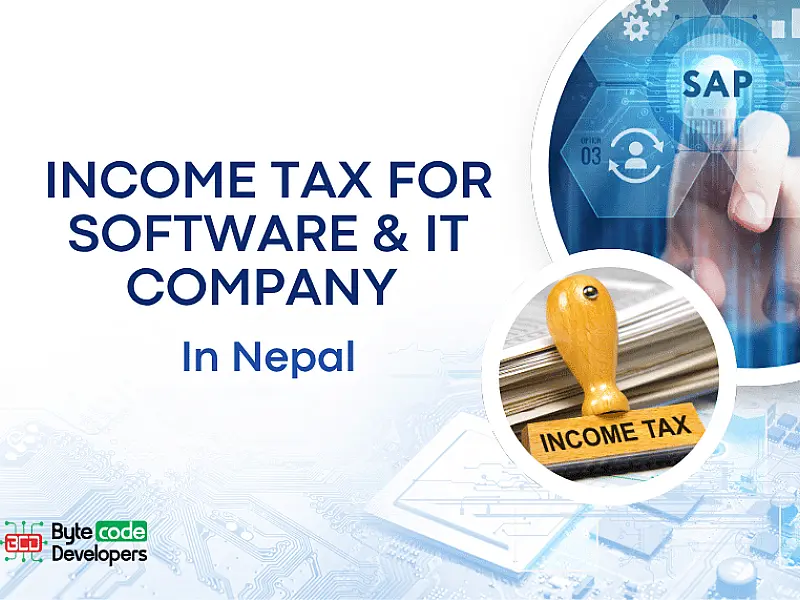
Table of Contents
Overview of Income Tax Laws in Nepal
The Income Tax Act, 2058 (2002) is the primary law governing income tax for all businesses in Nepal, including software and IT companies.
Key principles:
- Tax applies on net profit after expenses
- Rates depend on company structure and ownership
- Returns must be filed annually
- Certain IT businesses may enjoy tax holidays or discounts
Whether you are a freelance developer or a registered private limited company offering SaaS, you're expected to comply with this act once you are earning.
Applicable Tax Rates for IT and Software Companies
As of Fiscal Year 2081/82 (2024/25), the tax rates for IT and software companies are:
| Company Type | Annual Tax Rate |
|---|---|
| Private Limited (Local) | 25% on taxable profit |
| Public Limited | 20% |
| Export-based IT Companies (100% export revenue) | 20% |
| Remuneration Income (Freelancers) | Normal slab based on income level |
In addition to this, a dividend tax of 5% applies on any distributed profit.
PAN and VAT Compliance for IT Firms
Before any income is earned, the company must:
- Register for PAN (Permanent Account Number)
- If annual revenue is above Rs. 5 million, also register for VAT
- Issue invoices with proper tax codes
- File monthly and annual returns accordingly
Without PAN, income is not considered legal, and banks may block inward remittances.
Presumptive Tax vs. Normal Tax Regime
Presumptive tax (lump sum tax) applies to small businesses with turnover under Rs. 30 lakhs (outside metro). But for IT companies:
- Most fall under Normal Tax Regime
- You must maintain profit & loss statements, ledgers, vouchers
This is especially true if you’re a Pvt. Ltd. company or serve foreign clients.
Tax on Profit Distribution (Dividend Tax)
After you pay corporate income tax, any dividend distributed to shareholders is subject to 5% final tax. This must be:
- Declared via board decision
- Distributed through banking channels
- Reported in IRD return
This is a final tax, meaning shareholders don’t need to pay additional tax on dividends received.
Tax Incentives and Exemptions for IT Sector
To encourage tech innovation, the government provides:
| Incentive | Description |
|---|---|
| 25% rebate on corporate tax | For export-based IT companies |
| 100% tax exemption for 5 years | For registered startups in IT Parks |
| Customs duty waivers | On servers, routers, dev hardware |
| Foreign income exemption | For software exported and income repatriated officially |
These benefits must be claimed via proper tax filing and DoI/NITC approvals.
Annual Tax Filing Obligations
All IT businesses must submit an annual tax return (Sampurna Prativedan) by the end of Ashadh (mid-July).
Documents required:
- Audited Financial Statements
- Tax computation sheet
- Tax payment voucher (if any due)
- Director’s report
Late submission attracts penalty, starting at Rs. 5,000 and escalating with time.
Withholding Tax on Foreign Payments
If you’re buying tools or services from abroad (e.g., AWS, Google Cloud, SaaS):
- 15% TDS (Tax Deducted at Source) may apply if no DTA (Double Tax Agreement)
- Use Form 61/62 to remit payment legally
- Also, deduct 1% TDS on consultants or freelancers working under your brand
International Clients & Dollar Income
Income from foreign clients (freelance or corporate projects):
- Must be routed via SWIFT or bank channels
- Declare under “Foreign Service Export”
- File Tax Return + Proof of Income
- Income in foreign currency must be converted into NPR at Nepal Rastra Bank exchange rate during filing
Note: No VAT is applicable on software exports.
Common Tax Deductions Allowed
To calculate net taxable profit, deduct:
- Employee salaries and benefits
- Office rent and utilities
- Domain, hosting, software license fees
- Depreciation on computers/equipment
- Marketing and online subscriptions
- Local travel and client meetings
Make sure all expenses are properly billed and documented.
Fines, Penalties & Non-Compliance Risks
| Non-Compliance | Penalty |
|---|---|
| No PAN | Fine + backdated tax |
| Late filing | Rs. 5,000 – Rs. 100,000 |
| Not maintaining records | Tax estimation + 25% penalty |
| False invoicing | Upto 100% of tax due |
| Non-payment of TDS | Rs. 1,000/month + interest |
The IRD conducts random audits, especially on companies showing high revenue but zero profit.
Conclusion
Navigating income tax as a software or IT company in Nepal might seem tricky — but with the right structure, documents, and tax consultant, it’s fully manageable.
Ensure you register early, keep your books clean, and take advantage of every exemption and deduction you’re entitled to. The digital economy is Nepal’s future, and staying tax compliant means you’re future-proofing your business.



 June 04, 2025
June 04, 2025









-thumb.webp)

-thumb.webp)
-thumb.webp)
-thumb.webp)